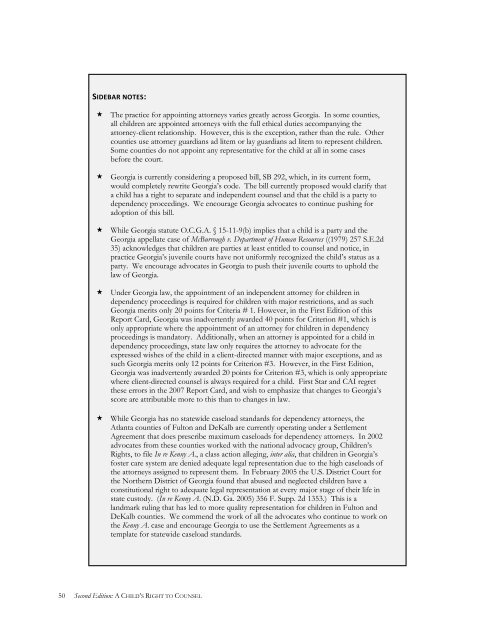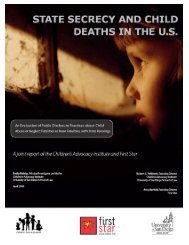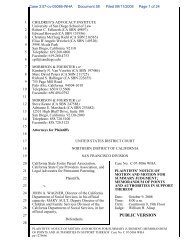A CHILD'S RIGHT TO COUNSEL - Children's Advocacy Institute
A CHILD'S RIGHT TO COUNSEL - Children's Advocacy Institute
A CHILD'S RIGHT TO COUNSEL - Children's Advocacy Institute
- No tags were found...
Create successful ePaper yourself
Turn your PDF publications into a flip-book with our unique Google optimized e-Paper software.
SIDEBAR NOTES: The practice for appointing attorneys varies greatly across Georgia. In some counties,all children are appointed attorneys with the full ethical duties accompanying theattorney-client relationship. However, this is the exception, rather than the rule. Othercounties use attorney guardians ad litem or lay guardians ad litem to represent children.Some counties do not appoint any representative for the child at all in some casesbefore the court. Georgia is currently considering a proposed bill, SB 292, which, in its current form,would completely rewrite Georgia‘s code. The bill currently proposed would clarify thata child has a right to separate and independent counsel and that the child is a party todependency proceedings. We encourage Georgia advocates to continue pushing foradoption of this bill. While Georgia statute O.C.G.A. § 15-11-9(b) implies that a child is a party and theGeorgia appellate case of McBurrough v. Department of Human Resources ((1979) 257 S.E.2d35) acknowledges that children are parties at least entitled to counsel and notice, inpractice Georgia‘s juvenile courts have not uniformly recognized the child‘s status as aparty. We encourage advocates in Georgia to push their juvenile courts to uphold thelaw of Georgia. Under Georgia law, the appointment of an independent attorney for children independency proceedings is required for children with major restrictions, and as suchGeorgia merits only 20 points for Criteria # 1. However, in the First Edition of thisReport Card, Georgia was inadvertently awarded 40 points for Criterion #1, which isonly appropriate where the appointment of an attorney for children in dependencyproceedings is mandatory. Additionally, when an attorney is appointed for a child independency proceedings, state law only requires the attorney to advocate for theexpressed wishes of the child in a client-directed manner with major exceptions, and assuch Georgia merits only 12 points for Criterion #3. However, in the First Edition,Georgia was inadvertently awarded 20 points for Criterion #3, which is only appropriatewhere client-directed counsel is always required for a child. First Star and CAI regretthese errors in the 2007 Report Card, and wish to emphasize that changes to Georgia‘sscore are attributable more to this than to changes in law. While Georgia has no statewide caseload standards for dependency attorneys, theAtlanta counties of Fulton and DeKalb are currently operating under a SettlementAgreement that does prescribe maximum caseloads for dependency attorneys. In 2002advocates from these counties worked with the national advocacy group, Children‘sRights, to file In re Kenny A., a class action alleging, inter alia, that children in Georgia‘sfoster care system are denied adequate legal representation due to the high caseloads ofthe attorneys assigned to represent them. In February 2005 the U.S. District Court forthe Northern District of Georgia found that abused and neglected children have aconstitutional right to adequate legal representation at every major stage of their life instate custody. (In re Kenny A. (N.D. Ga. 2005) 356 F. Supp. 2d 1353.) This is alandmark ruling that has led to more quality representation for children in Fulton andDeKalb counties. We commend the work of all the advocates who continue to work onthe Kenny A. case and encourage Georgia to use the Settlement Agreements as atemplate for statewide caseload standards.50 Second Edition: A CHILD‘S <strong>RIGHT</strong> <strong>TO</strong> <strong>COUNSEL</strong>






